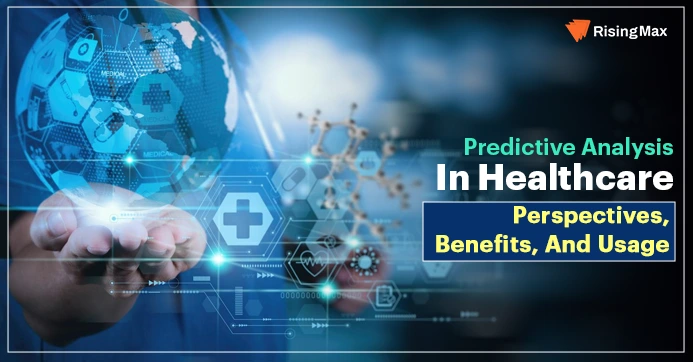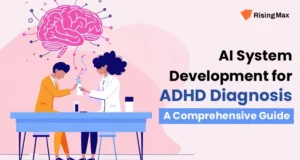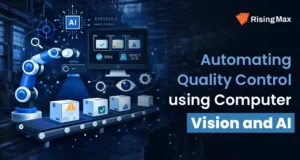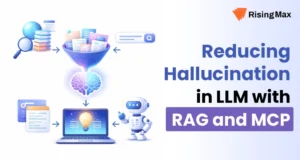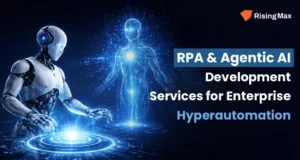Predictive analysis is a method to go through a data set and discover irregular patterns to predict possible future events. In the predictive healthcare industry, it can be used for effective analysis and data processing. It analyzes a case’s current and historical data; if any dissimilarities are found in the system, it can acknowledge the system with the stats.

It enhances the capabilities of healthcare professionals and helps with quick clinical support. It will help develop a professional approach toward patient and healthcare management. It examines medical reports, disease records, processed medicines, and predictive trends to explore the patient’s current condition and advise follow-up medical requirements.
Use Of Predictive Analytics In Healthcare
The example of predictive analytics could be endless in the healthcare industry. The healthcare industry deals with plenty of data daily but needs help converting it into useful insights. The data insights can help improve patient care, hospital clinical care, and operation care. The healthcare insights would be very helpful in improving patient care and diagnosing the disease.
It will reduce the treatment cost and effective care process, improving the patient care methods and operational management. With the help of predictive analysis, the clinical procedure would enhance the internal rotation of the hospital and co-ordinates with the efficiency of treatment care of the patient. Data analytics can change how clinical data is processed to care for the patient. A few insights into the healthcare industries are as follows:
- Recognizing new ways to treatments
- Forecasting the possible treatment
- Finding appropriate medicine
- Decisive support
- Automation of hospital management
- Precise health insurance rates
- Finding accurate reports to diagnose
- Increase in the surgeries & operations
Facts & Figures
- 60% of healthcare executives say their organization has adopted predictive analytics, according to a 2019 survey from the Society of Actuaries.
- A dedicated team of experts found that predictive models using clinic-level data could capture an additional 4800 patient no-shows per year with higher accuracy than previous attempts to forecast patient patterns.
- According to research, 60% of healthcare executives already used predictive analytics in 2019, and 20% more started using it in 2020. The healthcare predictive analytics market is expected to grow seven times, exceeding $28 billion between 2019–2027.
- Research & markets stated that the global healthcare predictive analytics market is expected to grow from $10.69 billion in 2021 to $13.67 billion in 2022 at a compound annual growth rate (CAGR) of 27.9%.
RisingMax Inc. has been immensely popular for providing software solutions to various industries. They recognized the power of modern-age technologies back in 2010, and since then, RisingMax has never looked back. Call us for a free consultation, and we’ll find the right digital solution for you.
Benefits Of Predictive Healthcare Analytics
The healthcare industry has an impact on predictive healthcare analytics. It evolves machine learning and artificial intelligence, which can help diagnose and care for patients. Predictive healthcare ensures the healthcare industry entertains the benefits of predictive analytics. Let’s figure out the benefits of predictive healthcare analysis:
Improvement In Patient Care
Predictive healthcare analytics provides accessibility to all sorts of data, including historical records, comorbidities data, demographical data, and financial information. It helps doctors, healthcare nurses, and staff look into valuable insights, giving ideas to make good decisions.
Align the current state of IT with your business strategy by hiring the most trustworthy Healthcare IT consulting company
Example of predictive analytics in healthcare
It can be used in the treatment of patient care. Doctors and healthcare professionals can look into the history of the data and use machine learning algorithms to give better insights into this patient’s treatment. This will make the solution feasible and provide accuracy while treating each patient.
Specialized Treatments
The deployment of predictive analytics in the healthcare industry can broaden the way of therapy and treatment. As a medical professional, it takes work to look into the history of records for a patient and then suggest a treatment procedure.
It makes the treatment of all the patients less efficient and time-consuming. But with predictive healthcare analysis, the process of diagnosing the problem and improving the treatment condition will become quicker and more efficient.
People’s Chances Of Survival
Predictive health analytics can help manage population health. Healthcare organizations can use the patient’s existing needs, health records, personal information, and analytics to analyze other patients with the same history or records. If a patient is found with the same outbreak, the disease could be cured with the same diagnostic treatment, if not better.
Healthcare professionals will develop a profile for such records that could tally other patients with the same history or records. It will be beneficial to share the records and save lives. The chances of survival within this scenario would increase and create a great milestone in human history.
Identify Critical Patients
Sometimes, a patient may need an early innervation for a deep solution diagnosis. A person may go into critical illness all of a sudden with few or no symptoms at all. Such a critical condition needs to pay greater attention because the situation may worsen and could cost a life.
If a patient with a critical illness is identified early in the stage, he could be properly diagnosed in the early stage. While predictive healthcare ensures matching his/her necessary condition with the previously successfully cured patient, it will help heal a patient and save their life. Let’s understand this with an example:
Predictive Analytics Healthcare Examples
If a patient is found to have cardiovascular disease, then he or she needs to get hospitalized. Predictive analysis uses an analytic tool to identify the disease and give proper medical treatment based on previous treatments.
Forecasting Equipment Maintenance
Predictive analysis can help healthcare organizations by identifying the maintenance requirement for the equipment and machinery before any accident occurs.
Predictive healthcare analysis can predict certain repairs, failures, or maintenance of equipment, machinery, and tools. This will enhance the clinical procedure and healthcare management to improve the process and save many lives.
Predictive Analytics In Healthcare Examples
Reducing Readmissions Rates
Heart disease, COPD, and diabetes have an average of 15% to 20% readmission rates for patients in the industry. The industry can entertain socioeconomic information with predictive analysis so the diagnosis process may improve and patient care will be more feasible. Thus, it will improve the treatment procedure resulting in lower readmission rates.
R&D Into Treatment
Predictive analysis can be used as a modern weapon in health management. It can be perfectly used in research work to treat patients. Going through information like clinical records, the genetic information of the patients, and other data would be able to predict the precise treatment of the patient.
It also helps predict algorithms that foresee the patient’s condition for a selective treatment strategy. It can be streamed for research and tells the most suitable treatment strategy.
Health Insurance
Predictive analysis has helped several industries and could greatly help in healthcare management. Predictive analysis can forecast the accurate cost of a patient’s health insurance. It will be completely based on the patient’s condition, historical data, and hereditary records.
This will prevent fake insurance claims and convince more individuals to take health insurance. Predictive analysis can forecast such allegations and be a miracle for the healthcare industry.
What Can Predictive Analysis Accomplish In Healthcare?
- Predictive analysis can react to treatment.
- Seeking the chances for readmission.
- Identifying the patient’s disease and treatment procedure.
- Patient’s behavior on the treatment approach.
- Identifying real and fraudulent health insurance claims.
Technology Used In The Predictive Healthcare
Data Mining
Data mining is a procedural method in the predictive healthcare industry that uses several phases to gather and collect information and interact with the medical database. And after preprocessing, it will transform and predict the healthcare formulation. This technique is very helpful in the healthcare industry.
Data ming also adheres to the guidelines not to reveal patients’ sensitive data to anyone. This needs extreme care, which is why data mining uses an EHR system that helps protect and secure entire data in any healthcare management system.
Data Modeling
Data modeling is a method that uses analytical tools to check the historical record of a treatment procedure. It also helps to model how the data will be used. Predictive healthcare uses the standard data mining tools that ensure how the data should be used. And by using some other means, can be easily predicted future results in the treatment procedure.
Artificial Intelligence
Artificial intelligence can be easily described as a method for understanding complex situations and improving with the help of machine learning programs. Artificial intelligence processes the input data through the algorithms and purposely behaves more intelligently than humans. Artificial intelligence acts more wisely and can react to very complex conditions.
E.g., AI manages the records and calculates predictions for certain conditions. The impact of artificial intelligence cannot be overstated. AI eliminates human errors and makes several decisions on behalf of humans.

More than 13+ years of software development exposure has put RisingMax on top of the list. If you have a challenging requirement, contact us; we will find a solution for you!
Conclusion
The healthcare industry needs serious insights to give a feasible solution to healthcare management and patient treatment. Predictive analytics can help diagnose patient care more suitably than ever before. Predictive analytics come in handy to act instead of reacting. Its prediction is based on estimation and calculation through its algorithm and gives a better insight.
The predictive analysis involves certain tools and technologies like artificial intelligence, IoT, data mining, and data modeling for better data analysis and monitoring, which helps enhance treatment plans and customize treatment plans for every patient.
In developed countries, predictive analytics has already been introduced. More and more organizations would like to evolve with the predictive analysis procedure. There is a huge scope for predictive analysis in the healthcare industry.

